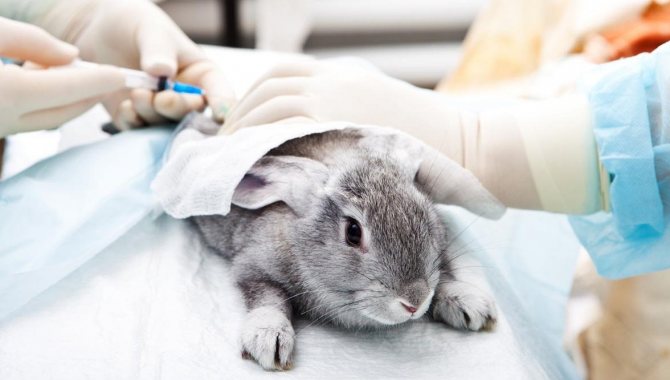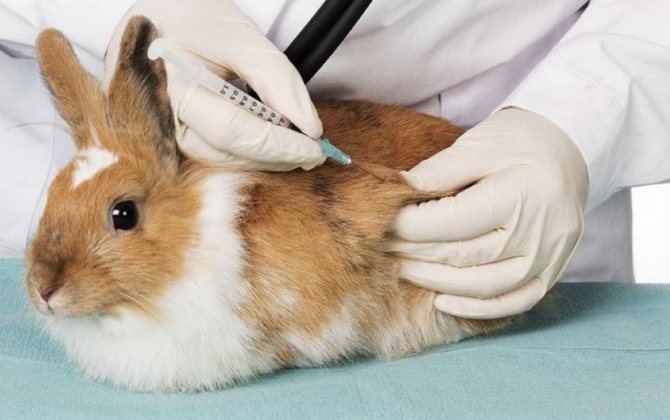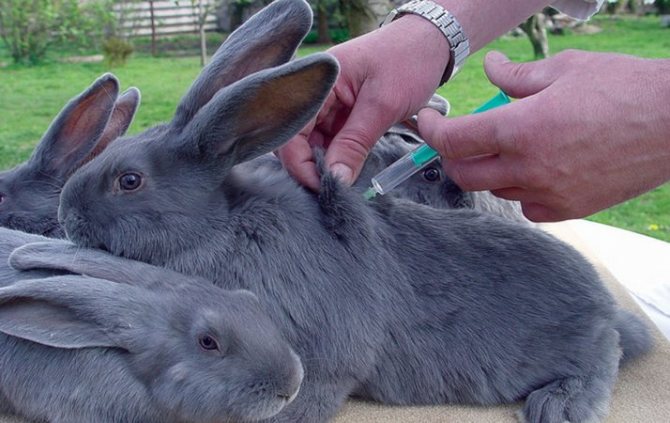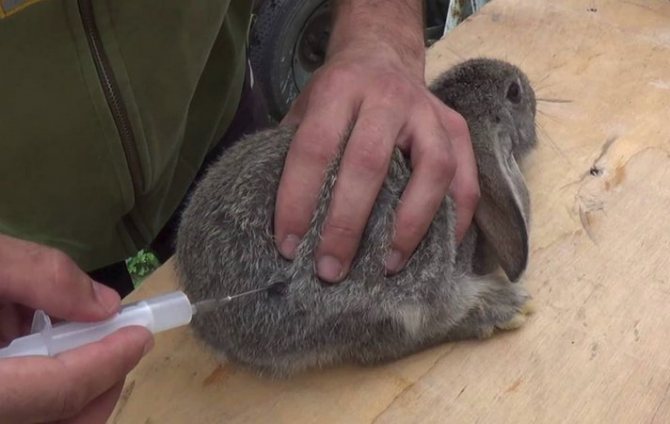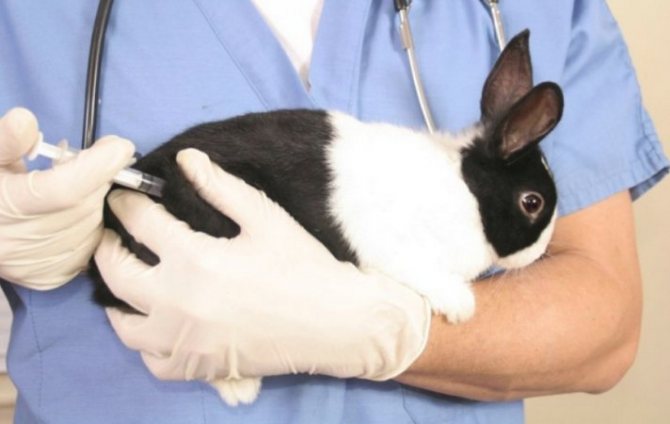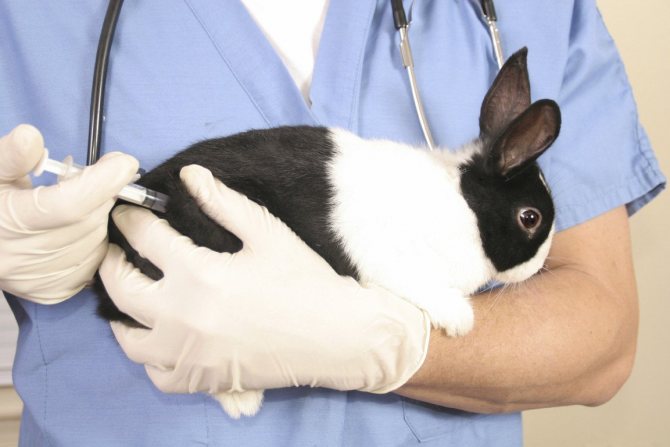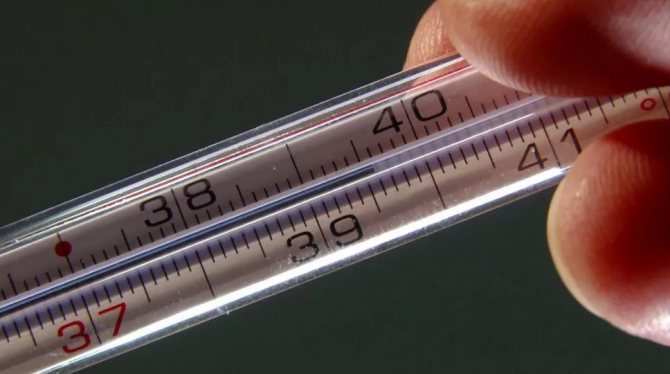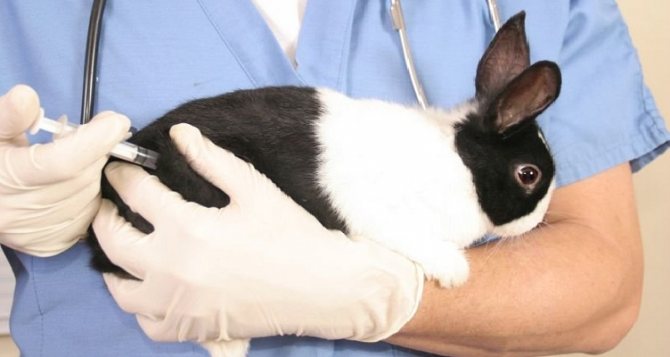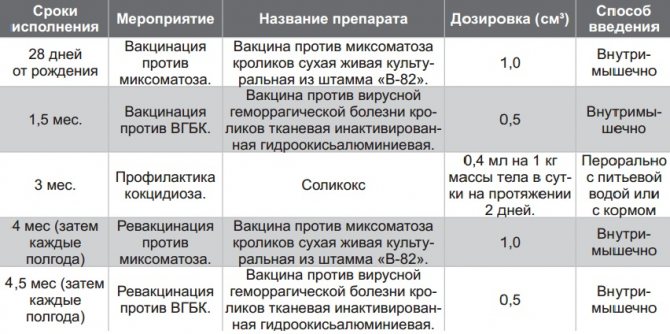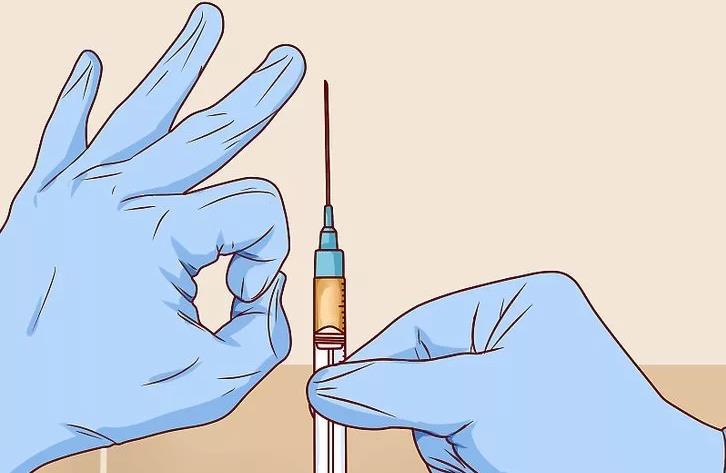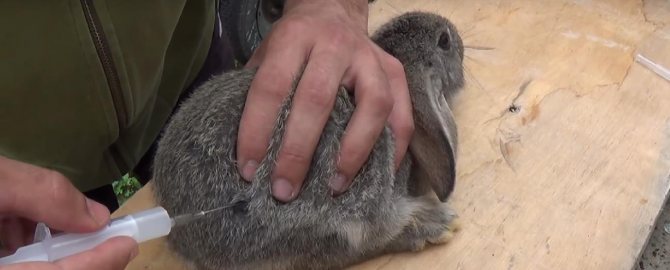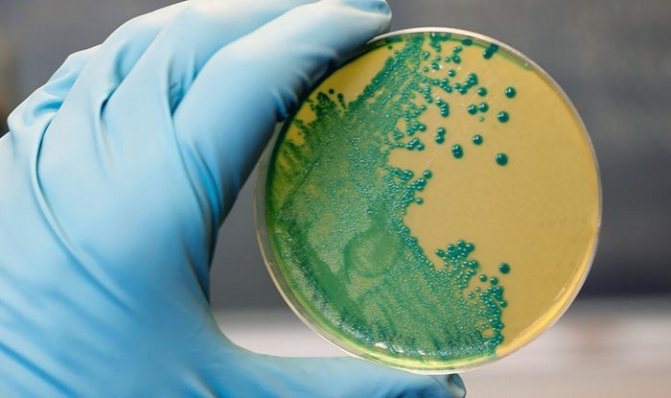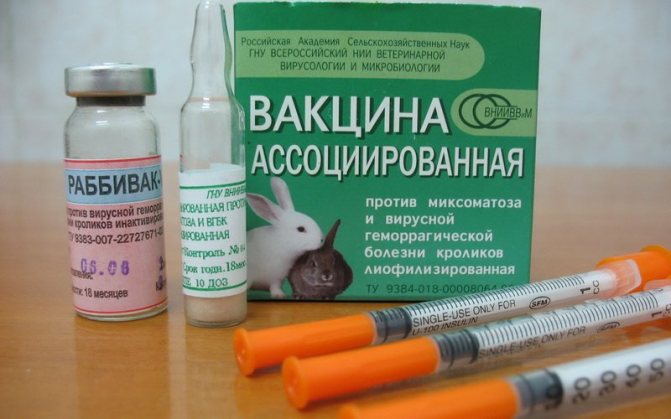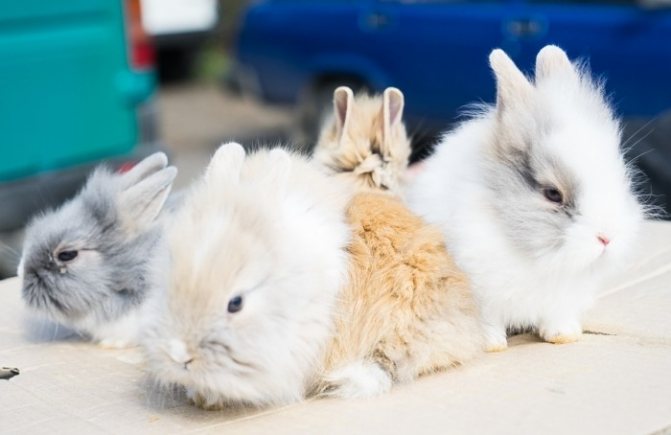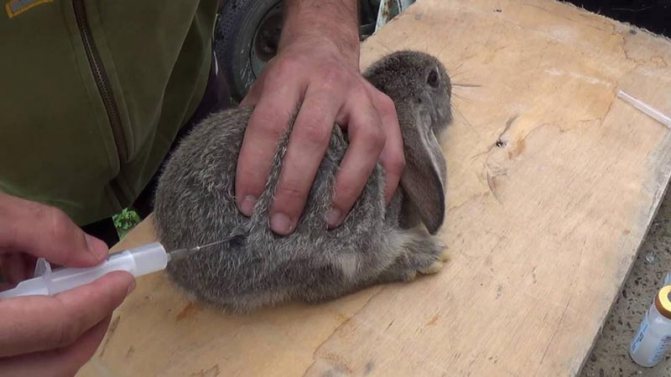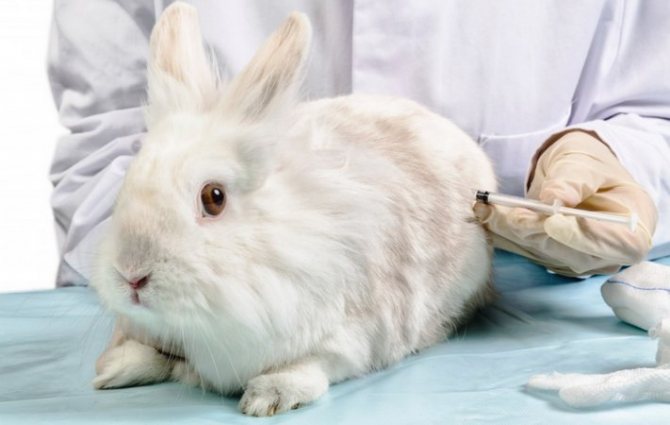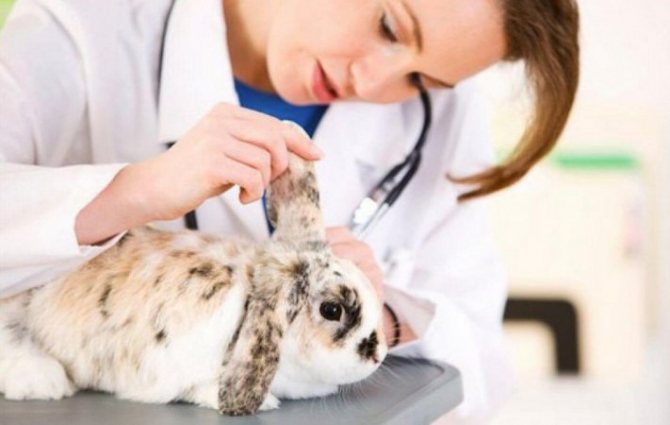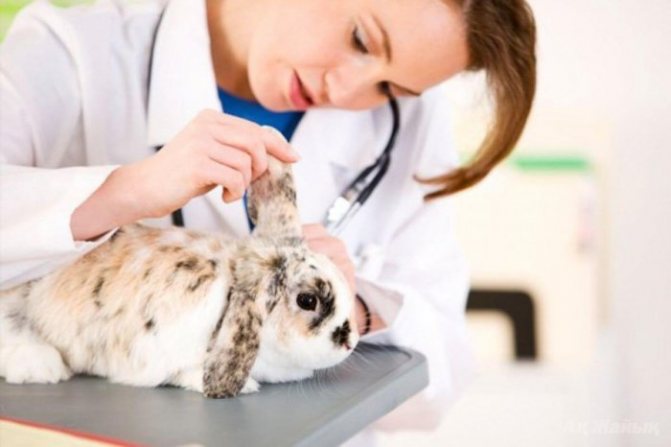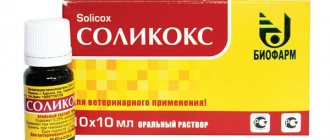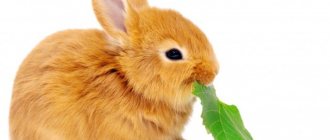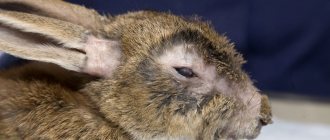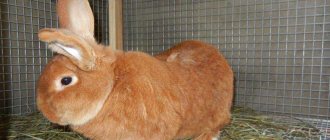What to consider before vaccinating rabbits?
Several times a year, immediately before vaccination, prophylaxis of coccidiosis is carried out, for which Baykoks or Solikox preparations are used, adding the required dose to the water according to the instructions.
Drinking prophylactic anticoccid drugs can take up to five days and this time gap is important to consider when planning vaccinations. In addition, some vaccines are given 14 days apart from the use of anthelmintic drugs.
In advance of vaccination, prophylaxis of invasions is carried out, for rabbits it is effective and convenient to use the modern complex anthelmintic drug Dirofen Pasta 20 at a dose of 1 ml per 1 kg of body weight from the age of 3-4 weeks.
Vaccination is carried out only on healthy animals - checking the condition on their own or, preferably, providing an examination by a veterinarian.
Normal rabbit:
- vigorous, resists when raised;
- body temperature - 38.5-39.5 ° C;
- eyes without discharge, slightly shining;
- the nose is clean and dry;
- the coat is glossy.
In this case, the general condition of the rabbit is also taken into account for several days before vaccination, while they note:
- healthy appetite;
- normal stools;
- the behavior is normal.
If everything is in order, rabbits are vaccinated, first of all, against highly virulent diseases - myxomatosis and viral hemorrhagic disease (VGBD).
The use of an associated (complex) vaccine containing attenuated strains of pathogens is effective and convenient.
Vaccination of decorative rabbits
Dwarf rabbits are also susceptible to disease and should be routinely vaccinated. Pets living in apartments are vaccinated, focusing on the epizootic characteristics of the settlement. For example, it is taken into account that blood-sucking insects, spreading myxomatosis, reach the height of the fifth floor at a distance of 30 km from the focus of infection.
The cost of injections depends on the quantity, the price of the selected vaccine, the place of the procedure, and the accompanying manipulations with animals.
The most dangerous diseases for rabbits
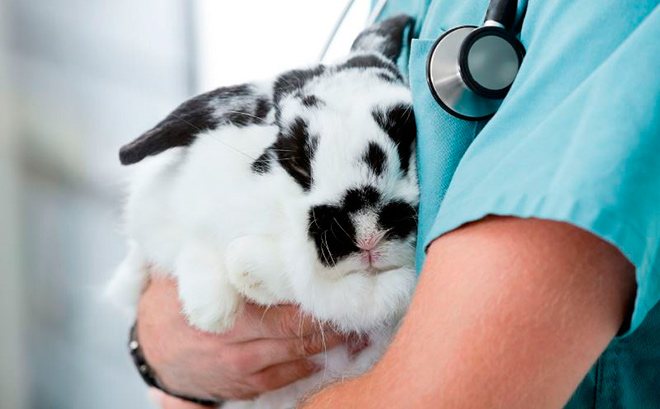
In rabbits there are two types of dangerous diseases that are often fatal - viral hemorrhagic disease of rabbits and myxomatosis. It is also worth highlighting another ailment that poses a strong danger to any type of warm-blooded animals - this is rabies.
Usually, vaccination is carried out against these diseases. But it should be borne in mind that it does not provide complete protection of rabbits from them, it only facilitates the course of these pathologies and accelerates the healing process.
VGBK usually develops in young individuals from the age of 1.5 months. During this pathological process, the animal develops hemorrhages in the lungs and liver in the form of hemorrhages and congestion.
Note! Infection with viral hemorrhagic disease can occur through litter or stool. It can also enter the animal's body by contact and non-contact. The main carriers of this infection are various insects, rats, mice, birds.
When it enters the cells, the viral organism begins to develop rapidly, multiply, and, together with the blood flow, falls into the liver and heart. The development of this pathology is observed within three days.
Be sure to pay attention to the main symptoms of the disease:
- decreased appetite;
- miscarriages in females;
- the appearance of mucous discharge from the nasal cavity;
- an increase in the body temperature of the animal up to 40 degrees;
- in severe cases, death cramps are observed.
Myxomatosis
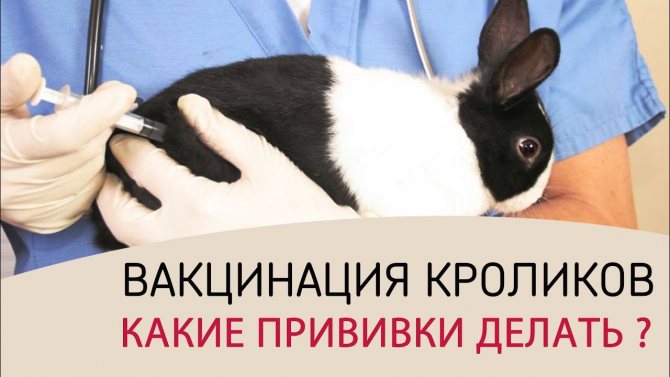

Myxomatosis is considered a very dangerous disease, which is often fatal. This pathology can affect the anus, the region of the lower digestive system, genitals, mucous organs of the head (nose, eyes, mouth).
The incubation period of this pathology is about a week, after which it will be possible to notice the first symptoms of myxomatosis. The virus can enter the body of rabbits through blood or by contact. But often it is spread by blood-sucking insects.
The symptoms of this disease are as follows:
- rabbits show signs of conjunctivitis. Their eyes and nose turn red. Also mucus secretions, crusty coatings appear;
- with a complication of the disease, large bumps with a dense structure appear on the surface of the whole body;
- the animal has wheezing and coughing fits;
- formations with a nodular structure appear on the surface of the anus, genitals.
Unlike myxomatosis and VGBK, rabbit rabbit is very rare, but it still occurs. It poses a serious danger to both animals and humans. Infection with this ailment usually occurs through the skin. During deep penetration, the nervous system is damaged.
Important! It is not possible to cure rabbits from this disease, for this reason it is fatal. The developmental period can last from a week to two weeks. Vaccination is considered the only protection against rabies.
The main signs that will help to understand that animal rabies is considered to be increased saliva production, the appearance of foam, aggressive or, on the contrary, too affectionate behavior.
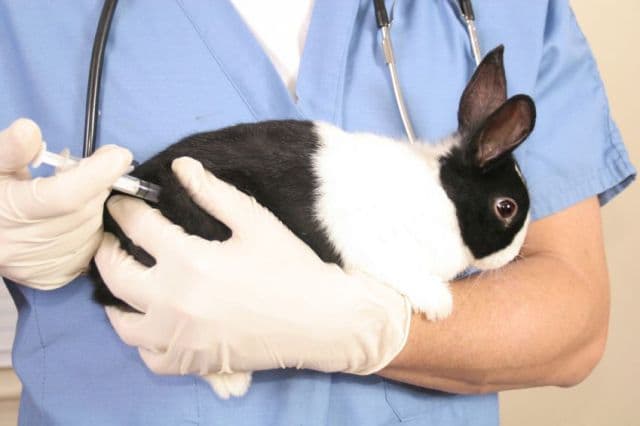

It is best to vaccinate at a veterinary clinic or at home under the supervision of a doctor. However, subject to the necessary rules, it is possible to get vaccinated on your own, but only after consulting a veterinarian.
Young animals and adults, as a rule, are prescribed half a milliliter per head. For this, sterile syringes and needles are used, injections are placed intramuscularly in the thigh or withers, after preliminary fixation of the rabbit. It is recommended that when self-administering the vaccine, use someone's help so that you can give the injection faster and more accurately.
It is not recommended to keep the opened package with the vaccine, it does not matter whether it is a vaccine against coccidiosis, pasteurellosis or hemorrhagic disease. The shelf life of a suspension diluted with distilled water is no more than three days.
Read about breeding and caring for Karmaly piglets here.
Rabbits, like other animals that are kept at home, need mandatory vaccination. This procedure will increase immunity, improve resistance to many infections and viruses. Even if the disease nevertheless struck single individuals, it will not turn into an epidemic and will not destroy all rabbits. At an early age, they are vaccinated against a disease called myxomatosis. In this disease, the lymphatic system is affected.
You can define it by the following symptoms:
- Lesions of the eyes and eyelids;
- Loss of coordination of movements;
- Increased body temperature;
- Enlarged lymph nodes behind the ears, in the neck;
- Formation of fibrous nodes.
Because the disease spreads very quickly, it is easier to prevent than to cure.Treatment does not always lead to full flock recovery. Vaccinations are done regularly, several times a year.
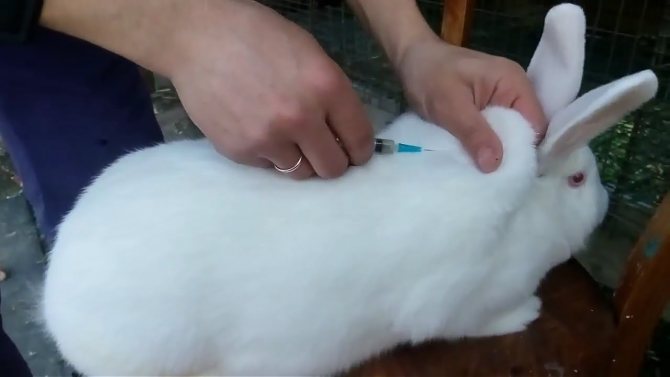

Vaccination of rabbits
Viral hemorrhagic disease is also prevented by vaccination, since there is no cure for it. This disease affects the internal organs of the animal: the liver and lungs.
VGBK has the following symptoms:
- A sharp increase in body temperature;
- Apathy;
- Refusal to eat;
- Heart palpitations;
- Frequent and loose stools, foamy.
When these symptoms occur, diseased individuals are placed in a quarantine zone so that the disease does not affect all of the livestock. Rabbits die 3 days after the first symptoms appear.
The unicellular parasites of coccidia cause the disease of the same name - coccidiosis. They affect the liver and gastrointestinal tract of the animal. Crawl organs affected by coccidiosis are not treated. He cannot fully assimilate food, vitamins are not processed by the body, the animal loses weight and soon dies.
The symptoms of the disease are:
- Stomach upset;
- Feces with foam and blood;
- A sharp rise in temperature;
- Refusal to eat;
- Mucous discharge from the eyes and nose;
- Wool falls out.
So that the disease does not become chronic or develop into an epidemic that will destroy all livestock, it is recommended to vaccinate rabbits. Coccidiosis is not fatal, in some cases it can be cured with medications, but the disease spreads very quickly, and if you do not notice the symptoms in one sick animal in time, literally in 48 hours most of the herd will be sick.
On a note. Also, animals can be vaccinated against rabies, paratyphoid fever, pasteurellosis and other diseases.
The first stage of preparation: deworming
It is very important to carry out anthelmintic therapy before vaccinations. The eggs of the parasites can enter the body of rabbits with food or from other animals. Parasites, being in the body, poison it with the products of their vital activity, causing intoxication and a decrease in protective functions. Today, veterinary pharmacies offer a wide range of all kinds of safe drugs that can quickly rid the animal of parasites. Most often used:
- shustrik;
- dirofen;
- parasicide.
Anthelmintics should be given 2 weeks before vaccination. In 14 days, the animal will have time to fully recover its strength. If the planned prophylaxis of worms was carried out 3 months before vaccination, then the vaccination can be done without additional prophylaxis of parasites.
Preparing for vaccination
Even a novice farmer can vaccinate rabbits at home. Although for the first time it is recommended to vaccinate animals in the presence of a veterinarian. You should also carefully study the instructions for the drugs that will be vaccinated. Animals must be prepared for vaccination.
To do this, a few weeks before the intended vaccination, it is necessary to carry out prophylaxis against helminths. The day before the administration of the drug, it is recommended to keep the temperature under control. The temperature is measured by inserting a thermometer into the anus. The normal range is considered to be from 38.5 ° C to 39.5 ° C.
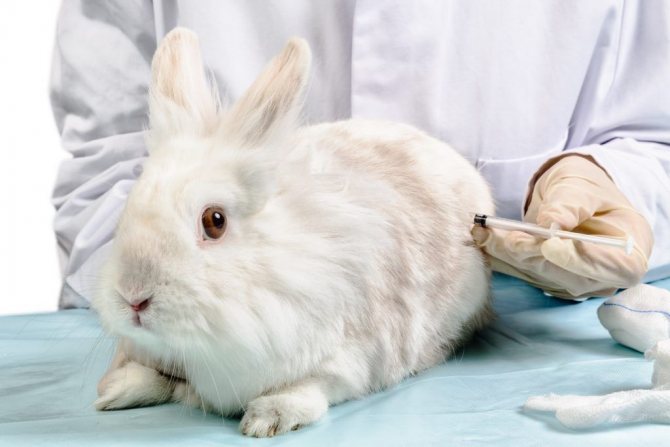

The instructions for a vaccine for rabbits against myxomatosis and HBV describe cases of allergic reactions, therefore, when vaccinating rabbits at home, antiallergic drugs should be in the first-aid kit. The urine and feces of the animal must be free of foreign impurities, of normal color, in case of deviation from the norms, vaccination is tolerated.
Rabbit vaccinations are available from veterinary pharmacies.
Important! The vaccine is checked for certificates, expiration dates and storage conditions.
How to get vaccinated yourself?
Many breeders practice self-vaccination of their livestock.It's cheaper and faster than hiring a veterinarian. Of course, the best option is if a specialist will examine the animal and administer the vaccine, but sometimes the owner himself can do all this. To do this, you must observe the following rules:
- Always read the instructions carefully. It should indicate the recommended doses, the timing of revaccination and the method of administration of the drug (into the muscle, intradermal or subcutaneous).
- Acceptable injection sites are the thigh, withers, or the area behind the ears.
- Purchased vaccine must not be frozen. Storage conditions must be carefully observed before use.
- If necessary, dilute the dry preparation with water, use a distillate. These vaccines should be used immediately after reconstitution, as they quickly lose their potency.
After vaccination, the animal should not be left unattended, as negative reactions may occur: redness or swelling of the mucous membranes, severe weakness, heavy breathing, increased salivation or skin rashes. Such an allergy is removed by the introduction of 0.2-0.3 cubic meters. antihistamine drug.
A competent approach to vaccination, in addition to the listed recommendations, includes the choice of a quality vaccine. You should not buy drugs at poultry markets and at spontaneous points of sale. If you have any doubts about the quality of the drug, it is better to contact a veterinarian who will recommend a vaccine manufacturer and a good veterinary pharmacy.
Decorative rabbits are vaccinated for the prevention of rabies. Unfortunately, today we have to deal with this disease more and more often. In addition to rabies, rabbits are susceptible to many diseases, against which it is necessary to make vaccines so that animals can fully develop and coexist next to humans. Even when a pet is constantly kept at home, it still has a chance of contracting an infectious disease brought from the street on the feet of its owners.
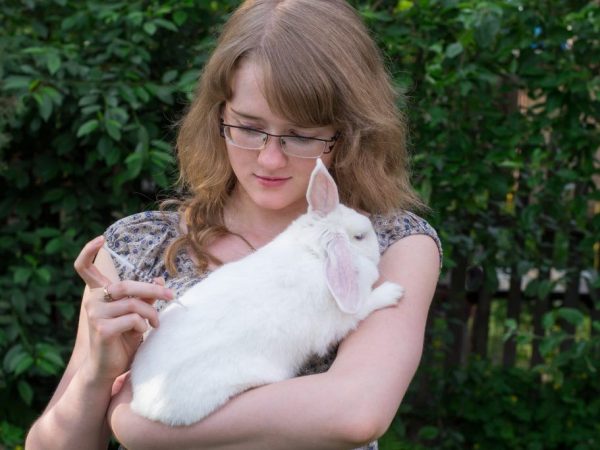

Vaccinations for decorative rabbits
Vaccination of rabbits with Lapimune Gemix vaccine
A two-component complex vaccine against myxomatosis and HBV creates stable immunity for 8-10 months, the production of antibodies begins 7-14 days after vaccination. The drug is packaged in vials of 10 doses.
One vial contains a suspension, which is drawn into a syringe and transferred to another vial with lyophilized contents, thoroughly mixing the components, after which the product is ready for use. The injection is performed subcutaneously, at a dosage of 1 ml.
Vaccination against myxomatosis
The peculiarity of the virus lies in the fact that it was artificially bred by humans. To combat wild rabbits, a French scientist created this pathogen. The virus rapidly spread and mutated. Animals are infected in most cases through insect bites, sometimes it can be spread by airborne droplets.
Symptoms of the disease:
- swelling of the organs of vision;
- temperature increase;
- the onset of apathy.
The death of animals occurs within two days.
When deciding to vaccinate, the rabbit owner must take into account some rules, otherwise vaccinations are absolutely pointless.
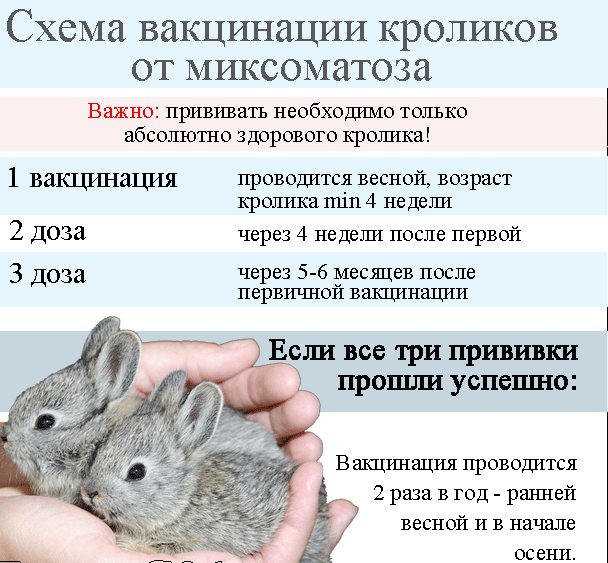

The first vaccination is in the spring. They vaccinate animals older than a month; the drug is re-administered after 30 days; the third vaccination is carried out after six months with the onset of autumn. It depends on the climatic conditions how to further vaccinate the livestock. This is done either every six months or every 365 days. The most important indicator is the health of the animal. Only healthy rabbits are vaccinated.
Complex vaccination
A rabbit recently injected with a vaccine begins to develop immunity to protect against a specific disease. In relation to other diseases, immunity is weakened.Accordingly, everything possible should be done to ensure that in the next 1.5 months. the rabbit did not catch the virus on the street or did not get infected from other animals.
If symptoms such as are found in recently vaccinated rabbits:
- weakness;
- loss of coordination;
- increased salivation;
- tearing.
animals should be given antihistamines and their behavior monitored. If lethargy and apathy persist, you should consult a veterinarian. After vaccinations, rabbits are thirsty. If the diet can be left unchanged, then the amount of fluid consumed should be increased.
Comprehensive vaccination for rabbits is convenient in that it immediately protects against several diseases. During it, an associated vaccine with attenuated Myxoma viruses and rabbit haemorrhagic disease is used.
The associated vaccine is packaged in ampoules, which are designed for a small number of doses. Also, this vaccine can be contained in vials, which can have from 5 to 120 dosages.
In order to obtain a ready-made solution, the powder is mixed with a solvent. A dose of 0.2 ml is injected intradermally, and 0.5 ml is administered intravenously. The finished preparation with a solvent can be stored for no more than 4 hours.
In addition to the associated vaccine, there is another drug - Nobivac Myxo-RHD. This tool is produced in Russia. The package contains an ampoule or a bottle of powder and a solvent. It is administered once, but the formation of immunity is observed only after 21 days.
Comprehensive vaccination should be performed in accordance with the following recommendations:
- it is recommended to vaccinate young animals at the age of 6 weeks;
- re-vaccination is not carried out;
- the formation of immunity is observed after 3 weeks;
- in regions where there are frequent cases of infection, re-vaccination can be carried out after 3 months.
It is important for every rabbit breeder that his offspring are protected from various dangerous diseases. For this reason, it is imperative to vaccinate rabbits. But in order for them to be truly effective, important rules must be followed:
- Vaccinations are given only to healthy individuals. If suddenly the rabbit is lethargic, it has suspicious symptoms, then it may be sick. It is advisable to put him in another cage for quarantine. In these cases, a veterinary examination is required;
- Before vaccinating, be sure to read the instructions, even if you have already performed these procedures before. The fact is that the vaccination schedule is constantly changing;
- Do not change the dosage yourself. This is dangerous because the vaccination may not have the proper effect, and as a result, the animal will not develop immunity;
- Don't change the timeline. Usually, the development of immunity occurs in a certain time, and if you change the timing, the vaccine may not work;
- About 10 days before vaccination, rabbits should be given anti-worm drugs;
- The interval between vaccinations should be no more than two weeks;
- It is recommended to purchase drugs in veterinary pharmacies;
- If you have already purchased adult rabbits that have not been vaccinated, then this is not a big deal. Perform all vaccinations according to the established schemes.
Done correctly, your pets will be protected from many diseases. But it is worth remembering that vaccination is not a medical procedure, it is performed for prevention. It makes the course of disease mild, and also speeds up the healing process, but it does not prevent infection.
When can I get my first shot?
Adults are recommended to be vaccinated outside the periods of mating and pregnancy. Due to the fact that the female carries babies for only 1 month, adjusting the vaccination calendar is not very difficult. Standard recommendations for the timing of the first vaccinations for babies are as follows:
- the average age for vaccination of young animals is 1.5-2 months;
- in case of an HBV epidemic, it is allowed to vaccinate small rabbits 30 days after birth;
- re-vaccination is carried out after 3 months, adults are revaccinated every 6 months.
While the baby rabbits are breastfed, they are protected by maternal immunity. With the normal development of the offspring, this protection persists for another month after the transfer of young animals to common feed. That is why newborn rabbits are not vaccinated, so as not to create an increased load on the animal body.
Vaccination with the RABBIVAC V vaccine against HBV
The Russian-made vaccine RABBIVAC B is used for vaccination against myxomatosis. The drug is packaged in ampoules or glass vials with a capacity of 1 to 100 doses. The vaccine looks like a dry, porous substance of light pink or yellowish color.
Vaccinations against viral hemorrhagic disease RABBIVAC V are carried out with an interval of 14 days after vaccination against myxomatosis. This additionally injures the rabbit and complicates the vaccination schedule and subsequent revaccination, so many owners give preference to associated complex vaccines.
The drug is packaged in glass bottles from 1 to 100 doses. The solution is prepared at the rate of 1 ml of water for injection per 1 dose. The injection is performed subcutaneously or intramuscularly, in the same way as the vaccine against myxomatosis RABBIVAC B, in the same doses and at the same time.
Drugs
Depending on the method of creating a vaccine and the number of infections against which it protects, live and inactivated vaccines, monovalent and combined preparations are distinguished. According to theoretical information, the use of live vaccines gives more stable and long-term immunity, however, such drugs impose a heavier burden on the immunity of animals.
Monovalent
When using monovalent vaccinations, it is necessary to maintain a break between vaccinations for at least 14 days. The following drugs are most often used in rabbit breeding:
- from VGBK - "Rabbiwak-V" made in Russia, "Lapimun Gem" made in Ukraine, "Pestorin" made in the Czech Republic, the drug of the Pokrovsky plant (Russia);
- from myxomatosis - "Rabbiwaak-V" made in Russia, "Lapimun Mix" made in Ukraine, "Mixoren" made in the Czech Republic, Pokrovsky's drug (Russia);
- from pasteurellosis - "Rabbiwak-R" made in Russia "Pazorin Ol" made in the Czech Republic.
Vaccination against other diseases for rabbits is carried out with general veterinary drugs in accordance with the schedule and epidemiological situation.
Combined
The most popular combination vaccines are drugs that include two components, aimed at developing immunity against hemorrhagic disease and myxomatosis. Most often, the kit includes 2 vials, the contents of which are mixed and administered together before the drug is administered.
The most popular combination vaccines among rabbit breeders:
- "Rabbiwak-VB" made in Russia;
- "Pestorin Mormix" made in the Czech Republic;
- "Nobivak Mukho-RHD" joint production of Russia and Holland;
- "Lapimun Gemix" made in Ukraine.
Read also Transplanted ficus benjamin leaves fall
Vaccinations during pregnancy and lactation
Any vaccination is allowed for pregnant rabbits. The baby rabbit will receive the necessary immunity along with the mother's milk, but it will be temporary. Only nursing rabbits are not allowed to be vaccinated, since that infection or virus that enters the rabbit's body during lactation gets along with milk to the young.
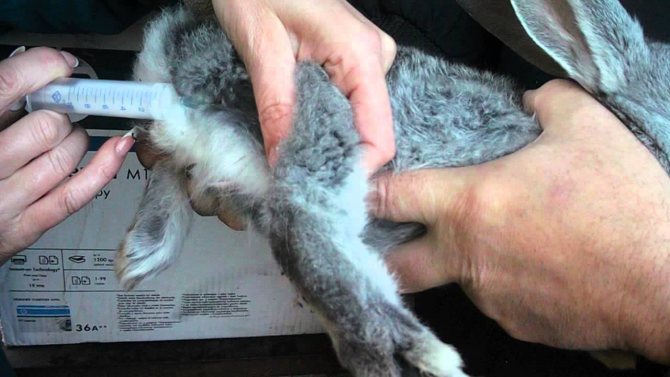

Vaccinations during pregnancy
During the period of bearing offspring, rabbits are recommended to select complex preparations for vaccination. The vaccination must be done by a veterinarian. In the next few days, the condition of pregnant rabbits should be kept under special control. For any side effects, you need to consult a specialist.
It is advisable to vaccinate rabbits before pregnancy.Because it is not known how a rabbit will transfer an infection or a virus into the body. An allergic reaction is possible. For the birth of healthy offspring, one should not risk the constant use of drugs. After vaccination, hold for about two weeks and only then mate.
Optimal age for vaccination
From the moment of birth to 6-7 weeks, the baby rabbit is breastfed, which gives natural immunity, it is not necessary to vaccinate during this period.
However, it is dangerous to miss the start time of vaccinations, as young rabbits are more susceptible to stress that lowers their immunity.
Pregnant females are given injections at any period of gestation only under the supervision of a veterinarian. During feeding, vaccinations are not done, the body of newborn rabbits is not ready to meet viruses.
Breeding rabbits are vaccinated two weeks before mating.
What is a comprehensive vaccine
Rabbit vaccines are divided into complex and monovaccines. Monovaccine is a one-component preparation containing serum from one disease. The complex vaccine contains sera from several diseases. In turn, complex ones are also divided into those that contain serum from two diseases, and polyvalent - from 3 or more diseases.
New generation vaccines do not imply a deterioration in the health of animals, due to a strong decrease in immunity to strains that are injected. Accordingly, rabbits tolerate the vaccination period quite well. At the same time, complex vaccination is good because you do not need to inject the animal several times over a short period of time. Financially, multivalent vaccines are more beneficial than multiple monovalent vaccines.
Composite vaccines can be divided into two types:
- Alive. When rabbits are vaccinated with live vaccines, immunity to diseases is developed faster, but the rabbit also reacts more strongly to a live vaccine. Live vaccines contain attenuated viruses. It is they who form stable immunity in animals to specific diseases.
- Inactivated. Viruses or infections that are introduced as part of inactivated vaccines contain dead microorganisms - pathogens. The rabbit reacts weaker to such vaccinations than to live ones. Immunity is developed for a shorter time.
The most popular bivalent complex vaccines for rabbits are:
- A Russian-made drug called "Rabbiwak V". Manufactured in the village of Don, which is located in the Lipetsk region;
- "Pistorin Mormyx", manufacturer - Czech Republic;
- Nobivak Myxo-RHD - Netherlands.
When using these drugs, you should strictly adhere to the mechanism of action indicated in the instructions.
Interesting. There is a pentavalent vaccine against different types of bacteria - "OKZ Vaccine".
Rabbit vaccine is available from certified points of sale only. If you use vaccines with a poor shelf life or improper storage conditions, there is a risk of serious harm to the health of the animal, with possible death.
Earlier we talked about individual vaccines, which help protect for a certain period of time from only one specific disease. However, now more and more often you can find stories of farmers about complex vaccines. What it is?
Comprehensive vaccination for rabbits is a drug that contains antibodies to many diseases. Currently, the most commonly used:
- Nobivak (can even be used as a rabbit vaccine against rabies);
- Pestorin;
- Lapimun.
When should rabbits be vaccinated? The vaccination schedule for rabbits with the introduction of complex vaccines differs from that described earlier.The first vaccination of rabbits occurs at 1.5 months, the second at 3 months; then every 6 months the procedure must be repeated. It is best to start a comprehensive vaccination in the spring.
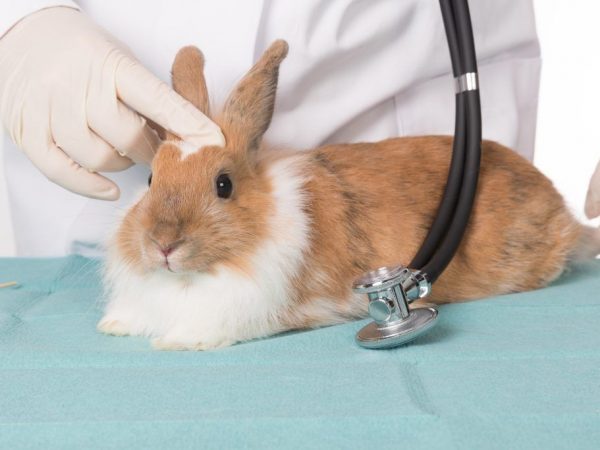

What is a comprehensive vaccination
The issue of vaccinations is especially acute when cases of infection with this or that disease have been recorded in the territories adjacent to the farm.
You can choose both a complex and a single vaccine, it all depends on personal preferences, as well as on financial capacity, because the cost of a complex vaccine in Russia is more expensive. How much does a vaccine cost in Russia? The price of one vaccine against rabbit diseases starts from 100 rubles per ampoule.
Earlier, we talked about the fact that a complex vaccine involves the introduction of antibodies against several diseases at once. This is the same virus, only in a lightweight form, which can be overcome by a healthy rabbit organism. It is important to purchase a vaccine that is of undeniable quality. Consultation with a veterinarian or advice from other farmers can help.
It is believed that it is more difficult for an animal to survive the introduction of a complex vaccine for rabbits, since the immunity has to fight several diseases at once, but this is not the case. A healthy body can handle this.
It is believed that it is the complex vaccine that acts more gently, because the eared has only one injection, so the period after vaccination in rabbits at home is easier. This is also explained by the fact that complex vaccines have been developed relatively recently, they belong to the second and third generation drugs.
Combination vaccines can now be found:
- From myxomatosis and viral hemorrhagic disease (Czech production).
- From salmonellosis and pastrellosis.
- Against pastrellosis and streptococcal infection.
Such a vaccine reduces the risk of developing side effects, which cannot be said about monovaccines.
When you can't get vaccinated
Only a healthy animal is vaccinated. Vaccination should be abandoned if:
- the air temperature is above + 28 degrees;
- the animal looks unhealthy;
- the vaccine has expired;
- the storage conditions of the drug are violated.
If the animal is already sick, the vaccine will not help it.
Very often, the stories of the owners that the vaccination "struck" and the vaccinated animal got sick are associated with the listed cases. If the decorative rabbit is vaccinated correctly, at the right time, the vaccine quite reliably protects it from viral infections.
When is vaccination useless?
There are several reasons why no vaccine result is observed:
- The pet got infected a few days or even hours before vaccination.
- The vaccination schedule or dosage has been violated.
- The farmer did not adhere to the rules for preparing the livestock for the procedure.
- An expired medication was introduced.
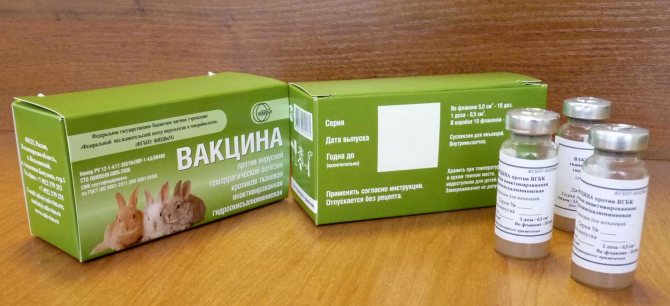

It is necessary to pay special attention to the date of issue of the product.
Experts recommend vaccinating all livestock without exception, even if there are no outbreaks of dangerous diseases in the region. Any additional vaccinations are recommended to be discussed with your veterinarian. Otherwise, vaccination will prevent losses for the farm and is not a complicated procedure, so it is better not to ignore it.
The period after vaccination and possible complications
The vaccinated individuals are kept in a separate cage for two weeks after the procedure. It is this time that is enough for the drug to begin to actively affect the body, after which the grafted rabbits will no longer be infected from sick animals.
Usually healthy individuals feel great 2-3 hours after the procedure. However, some of them have side effects:
- inflammation of the mucous membranes;
- active salivation;
- rash on the skin;
- lack of mobility.
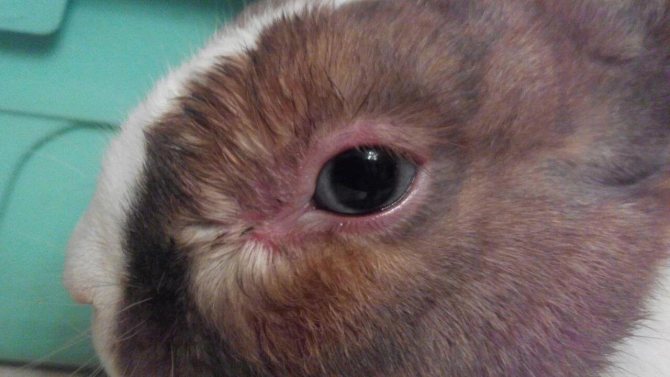

Redness of the mucous membrane of the eye in a rabbit
Most often, such signs occur as a result of an allergic reaction, therefore, it will be necessary to inject 0.3 ml of suprastin subcutaneously into the pet. In case of heart rhythm disturbance, an injection of Sulfocamphocaine should be given at the same dosage.
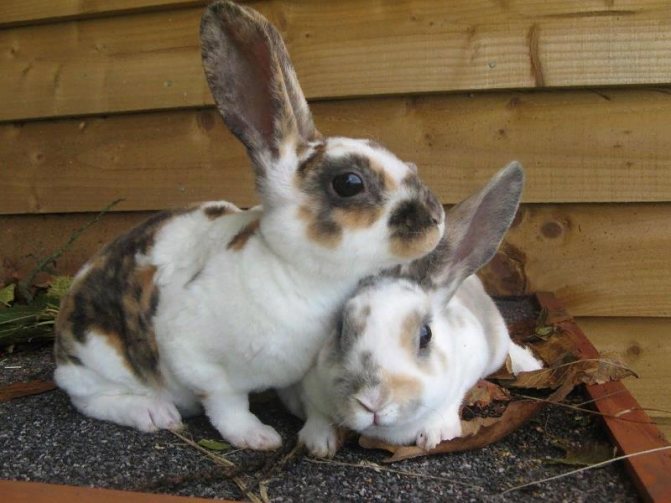

After vaccination, some pets may experience an allergic reaction - be on the lookout
How are rabbits vaccinated?
What is included in the vaccine? Live and inactivated (killed) viruses are taken as a basis. If a pet is injected with a live vaccine, then its immune system will be strong and will form much faster.
All drugs that are part of vaccinations are divided:
- monovalent, which contain 1 virus;
- complex, containing 2 or more viruses.
The introduction of the latter saves the breeder not only time, but also finances. However, it is impossible to objectively say which type of drug is better. Each has its own pros and cons.
If the breeder chooses to vaccinate rabbits with monovalent vaccines, he must remember that the interval between vaccinations is at least 2 weeks.
And also you need to be careful with the drug and not mix several drugs in one syringe. Each drug contains many components that are not always compatible with the constituent elements of another drug. This can lead to poor health of the pet.
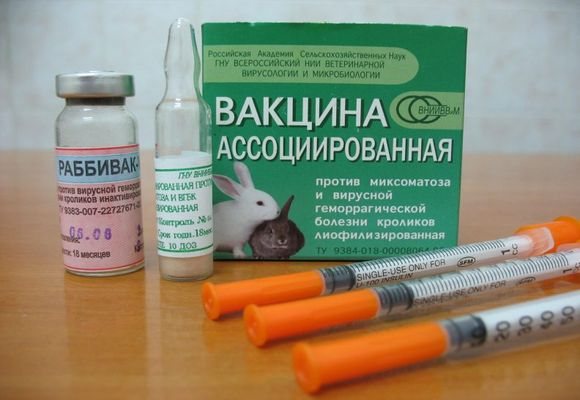

Monolet vaccination for rabbits
To protect rabbits from VGBK, drugs such as Rabbiwak, Pestorin, and a vaccine manufactured by the Pokrovsky plant are used.
Monovalent drugs will help protect animals from the dangerous myxomatosis disease:
- Rabbiwak.
- the drug "B82".
- Lapimun Mix.
- Mixoren.
So that pets are not afraid of pasteurellosis, two main monovaccines are used:
- domestic Rabbiwak;
- Czech Pazorin Ol.
Combination vaccines
Today there are many complex preparations containing 2 or more viruses. They show a quick and targeted action, so they need to be done in rabbits to prevent IHD and myxomatosis - the most dangerous diseases that these animals have.
Combination vaccines are bivalent drugs that are initially segregated for each virus. To make a vaccine, you need to mix the purchased vials. Do not be afraid that this may cause side effects.
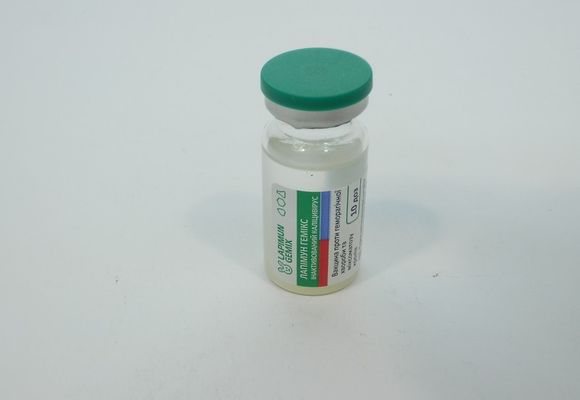

The components were selected based on the tests of biologists, so they have a scientific basis. After all the elements are mixed in the syringe, we vaccinate the pets. What vaccinations are given with combination vaccines? The most popular of these drugs are Lapimun Gemix, Rabbiwak-VB, etc.

